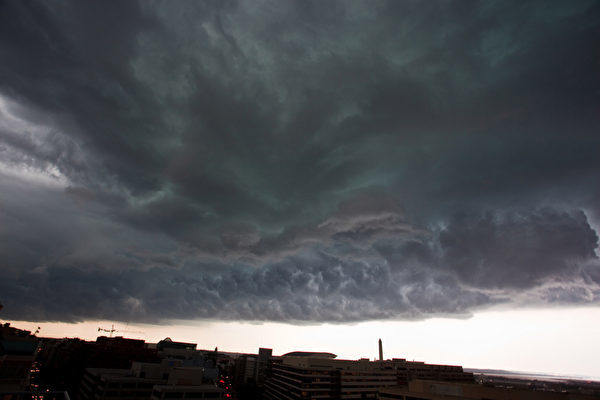(People News) - In recent days, reading reports from the Chinese military's official websites and newspapers gives a rather amusing impression. On one hand, they prominently feature the CCP leader's activities and thoughts, yet on the other hand, when reporting on how various military regions and branches are studying the spirit of the Central Military Commission’s (CMC) Political Work Conference, they downplay Xi and misinterpret his true intentions behind holding the meeting in Yan'an. Is this not contradictory? Why say this?
On February 5, PLA Daily reported that the Jiangxi Provincial Military District was deeply studying the spirit of the CMC Political Work Conference, focusing on how to "boost the morale and entrepreneurial spirit" of its personnel. On February 4, the report highlighted the Western Theater Command Air Force, focusing on how to "solve problems for grassroots units and enhance soldiers' sense of gain and belonging." On February 3, the focus was on the Inner Mongolia Armed Police Corps, studying how to "deepen ideological rectification and reduce burdens on grassroots units."
In all three reports, similar to previous ones from other military regions and branches, either Xi Jinping ("Chairman Xi") was not mentioned at all, or his name was mentioned only once. This once again indicates that the downplaying of Xi's status within the military is not mere speculation. It also suggests that the military might still be signaling loyalty to a new figure. More importantly, the focus of these reports on studying the spirit of the CMC Political Work Conference centers on trivial issues, misrepresenting the real intent behind Xi's convening of the meeting.
According to reports, in June of last year, Xi Jinping led CMC members Zhang Youxia and He Weidong to Yan'an, where they held the CMC Political Work Conference on June 17. Official accounts claim that this meeting was "personally decided and convened by Xi Jinping."
Xi’s speech at the meeting emphasized "political army building." He stated, "Currently, the international situation, national situation, party situation, and military situation are undergoing complex and profound changes. Our military is facing intricate political tests. We must firmly grasp the requirements of political army building in this era and continuously advance political army building without pause." He further stressed that "political work is always the lifeline of our military," and that "grasping ideological leadership is the foundation of all leadership."
Xi particularly emphasized that "senior cadres must place themselves into the context, summon the courage to set aside pride, expose shortcomings, and confront their flaws. They must deeply reflect with an attitude that digs into the root causes and touches the soul, seriously rectify issues, and resolve ideological root problems to push political army building to go deeper and more practical." The clear intent here was to launch a new round of purges within the military, targeting senior officers. This stems from the fact that, over the past two years, numerous senior generals—whom Xi considered disloyal—including Rocket Force commanders and deputy commanders, two defense ministers, and heads of military-industrial enterprises, have been arrested. This reveals that even after more than a decade as CMC Chairman, Xi still has not achieved full control or loyalty within the PLA.
Therefore, Xi hoped to capture another batch of senior officers disloyal to him through a new round of purges. Prior to this CMC meeting, a training session for newly appointed discipline inspection and supervision heads of military units at the corps level and above, with 80 participants, was held in preparation for this.
At the meeting, Xi also outlined six key tasks for political army building:
- Strengthening ideological reform, particularly for senior officers.
- Strengthening CCP leadership within the military.
- Strengthening the development of the cadre team.
- Eliminating the soil and conditions that breed corruption.
- Boosting morale and entrepreneurial spirit, including solving grassroots problems.
- Senior cadres setting an example and leading by personal conduct.
However, the three reports from February 3 to 5 focused only on the fifth task—boosting morale and addressing grassroots issues. None of the reports addressed the more critical first four tasks. Isn’t this peculiar?
Looking back at the military's study sessions before the Chinese New Year reveals a similar pattern. On January 24, the Shaanxi Provincial Military District focused on "solving problems for grassroots units and enhancing soldiers' sense of gain and belonging" while studying the spirit of the CMC Political Work Conference.
On January 20, the Third Affiliated Hospital of the Air Force Medical University studied how to strengthen the cadre team, emphasizing political loyalty. On January 18, the Nagqu Military Sub-district in Tibet focused on how party committee officials could improve their work style and assist grassroots units. On January 17, the Jiangsu Provincial Military District studied how to enhance the support and guarantee capabilities of the militia. On January 13, the Ninth Medical Center of the PLA General Hospital focused on improving medical support capabilities. Clearly, these sessions also did not address the key issues emphasized by Xi.
In fact, since the CCP leader's political troubles emerged in July of last year, there have been numerous unusual occurrences within the Chinese military and top leadership, with increasing signs that Xi may be losing control over the military. One such sign is that in the statements made during various military branches’ study sessions of the CMC Political Work Conference, there is little to no focus on the ideological reform of senior officers. If the interpretation of the conference's spirit—pushed by Xi himself—is being diluted or ignored, what else could explain this if not a loss of Xi’s authority?









News magazine bootstrap themes!
I like this themes, fast loading and look profesional
Thank you Carlos!
You're welcome!
Please support me with give positive rating!
Yes Sure!